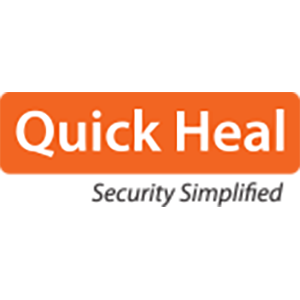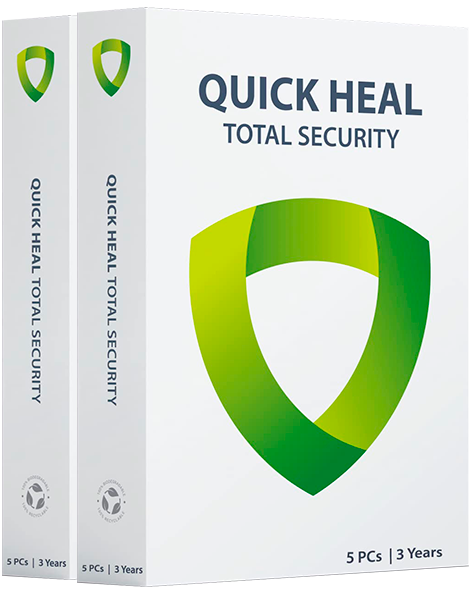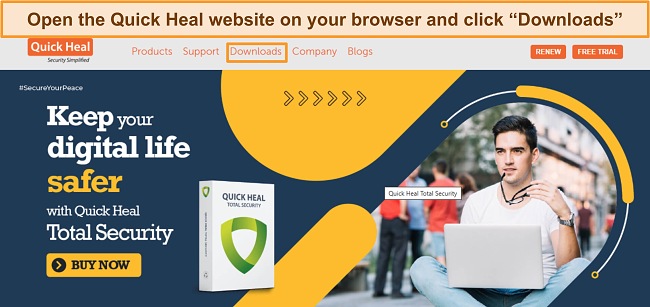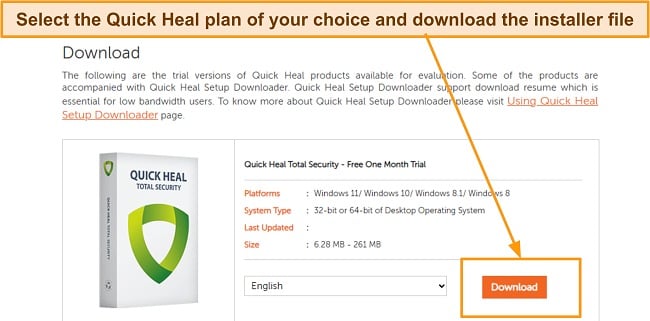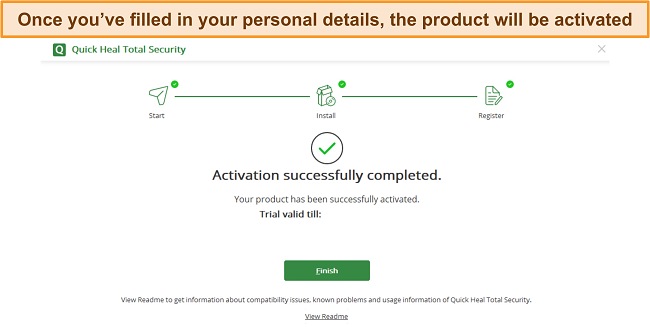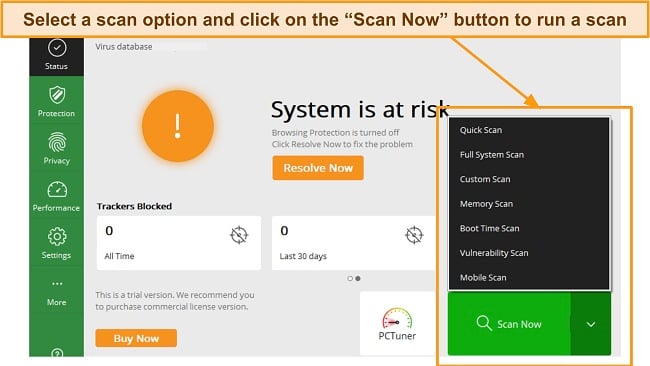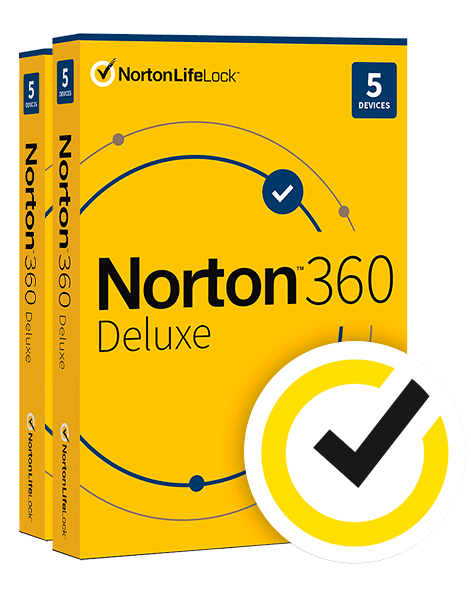Quick Heal Overview
Based in India and relatively unknown in other parts of the world, Quick Heal antivirus promises comprehensive protection to keep your digital life safe. I usually root for challenger security programs and I was looking to see if Quick Heal would bring anything new to make it stand out from the competition.
After extensive tests, I discovered that Quick Heal is not worth your investment. While it offers decent protection and a few good security features, the overall performance is somewhat mediocre at the pricing that it goes for.
You can get a better range of features, comprehensive protection, and excellent performance with top-tier antivirus options like Norton for less than what Quick Heal costs. You can try Norton’s plans risk-free using the 60-day money-back guarantee.
Try Norton risk-free for 60 days
In a Rush? Here’s a 1-Minute Summary
- Perfect malware detection rates — Provides 100% malware detection rates and real-time protection. See Quick Heal’s real-life test results.
- Multiple security features — Quick Heal provides an extensive range of features like a firewall, phishing protection, Tracker Cleaner, and more. Jump to see the full list of features.
- Straightforward Installation — Has apps for Windows, Mac, and Android, but doesn’t have an iOS app. Check how each app differs.
- Limited support options — No live chat or community forums, but you’ll get decent FAQ pages, phone, and email support. See my experience with the support options.
- Free trial on all plans — You can try the Quick Heal plans risk-free for 30 days. Jump to see the premium plan options.
Security
Quick Heal antivirus provides excellent protection against malware and other cyber threats. Like the top contenders in the industry, it achieves 100% malware detection rates and excellent real-time protection.
Virus Scan — Powerful Malware Scanner With Excellent Results
Quick Heal performed well in malware protection, detecting 100% of malware samples I downloaded to my test computer. During testing, I download test malware samples from the European Institute for Computer Anti-Virus Research (EICAR) to test the antivirus. Quick Heal antivirus successfully removed all the malware files, including those hidden in zip files.
For scanning options, Quick Heal antivirus offers the following virus scanner options:
- Quick scan — Checks critical areas for malware, providing a rapid yet effective security check.
- Full System scan — Scans the entire system, leaving no stone unturned to detect and eliminate potential threats.
- Custom scan — Allows you to choose specific files or folders for scanning, offering flexibility and tailored protection.
- Memory scan — Scans running processes and active memory for active threats, ensuring real-time protection.
- Boot Time scan — Detects and eliminates deeply embedded malware during system startup, preventing persistent threats.
- Vulnerability scan — Identifies system vulnerabilities and suggests necessary patches for enhanced security.
- Mobile scan — Offers comprehensive scanning and protection for mobile devices, securing your data on the go.
During my tests, Quick Heal’s Quick scan lived up to its name. It checked over 2,500 files in under 1 minute. While it’s fast, it checks fewer files compared to top-tier antivirus options. For instance, Norton uses less than 2 minutes to scan about 12,600 files.
For the Full System scan, Quick Heal antivirus was quite slow. It took 1 hour and 40 minutes to check through 419,847 files.
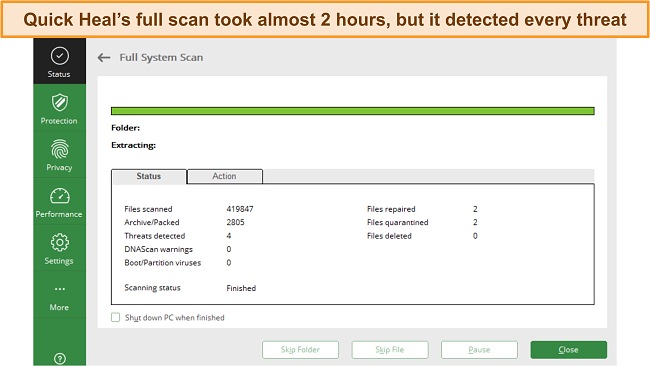
In comparison, Norton took just 22 minutes for its full scan to check around 1,000,000 files. Most top-tier antiviruses take less than 1 hour to run a full system scan, but Quick Heal antivirus took twice as much time.
Real-Time Protection — 100% Detection Rates for Real-Time Threats
Quick Heal antivirus achieved perfect detection rates for real-time cyber threats. It can detect and block viruses, worms, trojans, ransomware, spyware, adware, and other types of malicious software. During testing, Quick Heal detected and blocked 100% of real-time threats, including those discovered in the last 24 hours.
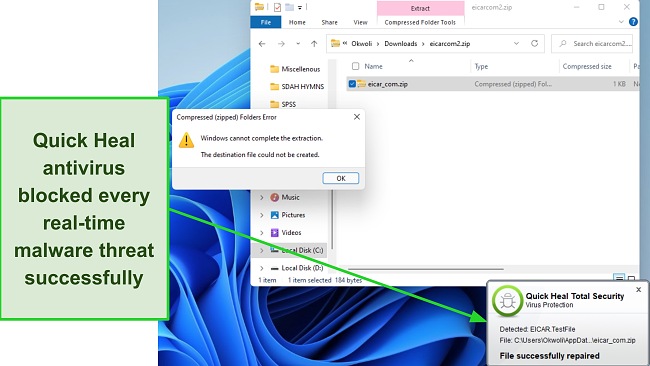
To achieve its perfect real-time protection scores, Quick Heal employs advanced algorithms and heuristics to identify malware based on their behavior patterns, characteristics, and signatures. This combination of virus signature database and behavior-based scan (Quick Heal’s Advance DNAScan, makes it very potent in detecting cyber threats.
Quick Heal offers protection for specific threats like ransomware and rogueware. The antivirus actively scans for these threats and blocks them in real time before they can cause damage to your computer. Ransomware and rogueware attacks are on the rise, so it’s great that Quick Heal focuses on blocking those threats.
System Performance — Minimal Impact on Device Performance
Quick Heal is lightweight on system resources. I didn’t experience any significant impact on my computer as I could browse, copy files, and install other apps without experiencing a major slowdown.
Here’s a breakdown of how much impact Quick Heal had on my PC performance.
| Test Type | CPU Utilization (no scan) | Memory Utilization (no scan) | Disk Utilization (no scan) | Full Scan CPU Utilization | Full Scan Memory Utilization | Full Scan Disk Utilization |
| Quick Heal | 2% | 71% | 0 MB/s | 36% | 75% | 53.7 MB/s |
Following my extensive tests, I observed a negligible increase in resource consumption while using Quick Heal antivirus. However, I also measured the percentage slowdown when carrying out different activities. Here’s what I found:
- Slowdown when launching popular websites: 13%
- Slowdown when launching standard software apps: 6%
- Slowdown when copying files: 2%
- Slowdown during installation of frequently-used apps: 24%
Overall, Quick Heal had minimal impact on device performance which was quite impressive to see given many lesser-known antivirus programs take a huge chunk of system resources during scans.
Privacy — Wide Range of Privacy-Focused Features
Quick Heal antivirus offers several privacy-focused features to protect your identity online. I was very impressed with the range of privacy features included in the antivirus suite.
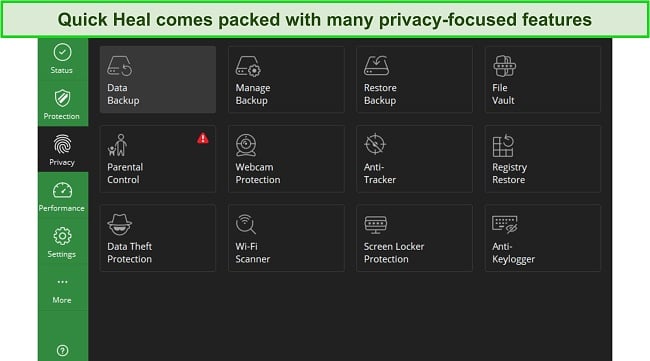
However, you’ll only get the comprehensive suite of privacy features on the top-tier plan. These features include:
- Data Backup — creates a local backup of files on your drive.
- File Vault — provides a password-protected local file vault to keep sensitive files.
- Webcam protection — blocks unauthorized access to your webcam.
- Parental Controls — protects your kids from inappropriate content when browsing.
- Anti-Tracker — blocks social media, advertising, and analytics trackers on your browsers.
- Data Theft protection — prevents unauthorized external drives from copying your data.
- WiFi Scanner — checks the security of the WiFi network you connect to.
- Screen Locker protection — activates screen locker protection with a combination of specified keystrokes.
- Anti-Keylogger — prevents keyloggers from spying on you.
Quick Heal’s parental controls proved effective in ensuring a safe online environment for my children. With content filters, website blocking, application controls, and scheduling options, I have the control to protect them from harmful content and monitor their online activities in real time.
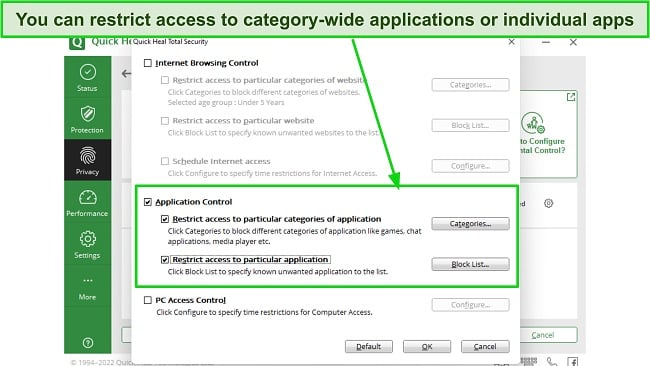
Unfortunately, the WiFi scanner didn’t work well during my tests. It failed to scan the WiFi network I was connected to and kept returning an error without any fix. It’s also disappointing that there’s no cloud backup or encrypted file storage on the cloud. In comparison, Norton offers all these features and they worked perfectly well during tests.
Features
Quick Heal antivirus comes with many security and optimization features, but most of them don’t perform as expected and lacked the features provided by top-tier antivirus options like Norton and TotalAV.
Firewall — Robust Firewall, but Not Easy to Configure
Quick Heal antivirus provides a robust firewall protection system. It employs advanced packet filtering techniques, monitoring incoming and outgoing network traffic to ensure only legitimate and safe connections are established. This effectively blocks unauthorized access attempts, shielding systems from potential hackers and intruders.
Quick Heal’s firewall protection can automatically detect and adjust security settings based on the network’s trust level, which could be low, medium, or high. This adaptability ensures that you can seamlessly connect to trusted networks while maintaining a robust defense against external threats.
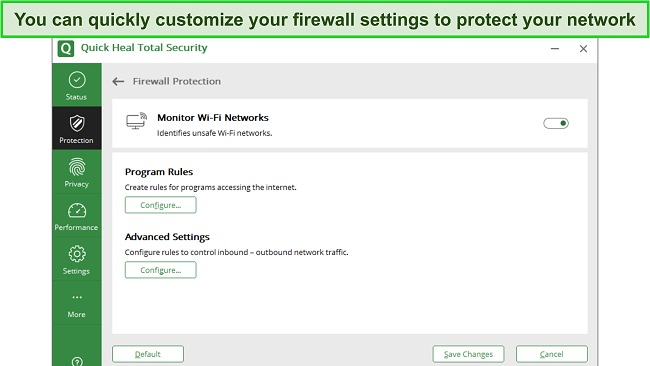
The firewall also includes stealth mode capabilities, which make systems virtually invisible to malicious scanning and probing activities from the internet. This stealth mode adds an extra layer of protection by preventing potential attackers from identifying and targeting vulnerable systems. Plus, it also comes with advanced settings that allow you to create network profiles, network rules, and activity reports.
Overall, Quick Heal’s firewall protection consistently demonstrated its effectiveness in safeguarding systems and networks. However, the interface was old and it could have been more modern and intuitive. Top antivirus programs like McAfee offer robust and easy-to-configure firewall protection, with a really simple and user-friendly interface.
Device Optimization Tools — Limited System Optimization Features
Quick Heal has a handful of device optimization features, but they’re not that impressive. The Tracker Cleaner features help to remove trackers from all the browsers on your device. However, the process is a bit antiquated, requiring selecting the specific browser activity that you want to clean.
The software also has a Do Not Disturb Mode and Game Booster feature. Unfortunately, while testing it, I didn’t see any improvements in my frame rates while gaming. More disappointing is that Quick Heal doesn’t have junk file removal, duplicate file finder, a startup manager, and other important device optimization tools.
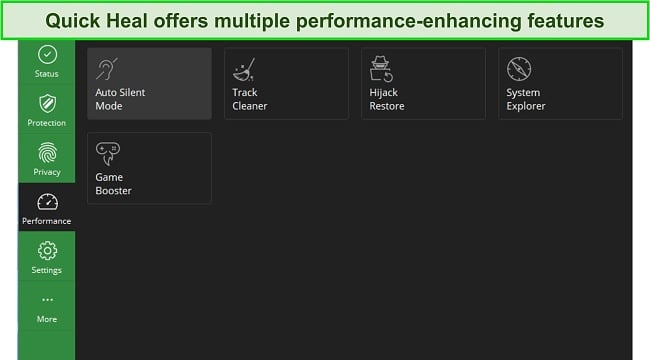
In comparison, TotalAV offers excellent performance-optimizing tools. In similar tests, Using TotalAV’s Smart Scan, I was able to remove 1.01GB of unnecessary files. Additionally, the scan identified an extra 1.84GB of duplicate files residing on my disk. One aspect I found particularly beneficial was TotalAV’s ability to present a clear overview of both unnecessary and duplicated files, enabling me to make informed decisions before deleting any data.
Other Features — Multiple Web Protection Tools
Quick Heal comes with a lineup of other important security features. They include:
- Email Protection — blocks malware attached to emails.
- Browsing protection — prevents access to suspicious websites.
- Phishing protection — blocks phishing sites when browsing.
- Safe banking — provides a secure web browsing environment.
- USB Drive protection — protects against malicious autorun programs on USB drives.
- IDS/IPS protection — blocks intrusion attacks.
Overall, Quick provides a good number of features, but you will find that it’s tedious using most of them. For instance, the Safe Banking browser extension prompted me to restart my PC before I could use it. I find the whole process rather stressful and less intuitive, especially for such a limited set of features.
Ease Of Use
Quick Heal antivirus is compatible with most devices. It has apps for Windows, macOS, and Android, but not for iOS devices. The installation process is straightforward, and the apps are feature-rich. However, given the limited device coverage, it doesn’t match up with the top-rated antiviruses on the market.
Desktop App — Easy-To-Use Apps for Windows and Mac
Quick Heal features a pretty simple interface for the desktop app. The features are well-arranged and navigation is easy. I didn’t have any issues finding particular features within the app. However, once you open some of the features, you’ll discover that the interface further within the app is less intuitive, like the firewall settings.
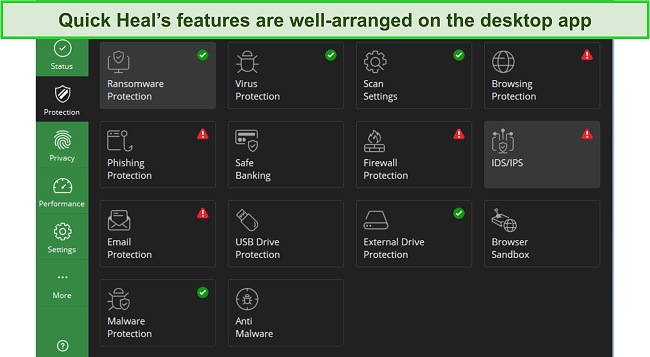
In addition, some of the tools don’t work. For instance, the WiFi scanner tool always returns an error, without telling me exactly what went wrong. Apart from that, the Windows and Mac apps are pretty easy to use, but there’s a difference in the features that they offer and the user experience for both apps.
Mobile App — Decent Protection for Only Android Devices
Quick Heal has a decent antivirus app for Android, but it doesn’t offer an app for iOS devices. I noticed however that the Android collects too much information, including your device’s IMEI and location data, which was rather strange. I’ve tested many mobile antivirus apps, and they don’t collect such granular data.
Once you’ve set up the app, though, you’ll find many features such as:
- Malware scanner
- Phone Boost
- App Lock
- Anti-Theft
- Data Breach Alert
- Parental controls, and more.
I ran the malware scanner, which took around 5 mins to scan my phone, but it didn’t find any malware on my Android device. Overall, the Quick Mobile Security app is feature-rich and easy to use, but it requests too much device access like location data and even the ability to make phone calls, which I’m not comfortable with due to privacy concerns.
How to Download Quick Heal Antivirus on Windows
Quick Heal can be installed on your Windows computer easily, but you won’t get as much protection as you would with the best Windows-focused antiviruses on the market.
- Go to the Quick Heal website — Open a web browser and visit the official Quick Heal website.
![Screenshot of Quick Heal homepage page Screenshot of Quick Heal homepage page]()
- Select a product — Navigate to the “Downloads” or “Products” section. Select the appropriate version of Quick Heal Antivirus for your Windows operating system.
- Download the setup — Click the “Download” button and wait for the download to complete.
![Screenshot of Quick Heal app download page Screenshot of Quick Heal app download page]()
- Install the app — Locate the downloaded setup file and double-click on it to start the installation process.
- Complete the installation — Follow the on-screen instructions to complete the installation.
- Activate the app — After the installation, restart your computer and activate Quick Heal Antivirus.
![Screenshot of Quick Heal activation page Screenshot of Quick Heal activation page]()
- Run a virus scan — Next, launch the app and click the green “scan” button to check for malware on your device.
![Screenshot of Quick Heal scan options Screenshot of Quick Heal scan options]()
That’s it! You’ve successfully installed Quick Heal antivirus on your Windows device.
Support
Quick Heal offers several support options such as phone support, online knowledge base, and email support. On their website and app, they claim to provide live chat support and community forums, but those links simply don’t work. For an antivirus that packs so many features, it’s rather disappointing that they offer so few support options.
Online Knowledgebase — Extensive and Thorough FAQs
Quick Heal’s online knowledge base is decent, offering a couple of helpful answers to FAQs for its different product offerings. I searched through the FAQs about general queries, installation guides, how to use the antivirus and much more.
Email Support — Difficult-To-Find Email Support Option
Quick Heal also allows you to send submit an email ticket to resolve your issues. On the app, you’ll find a link to the email support ticketing system, but like live chat, this also doesn’t work. The link leads to the online knowledge base page and not email support. However, I was able to find an email address (support@quickheal.com) which you can send your queries to.
Price
Quick Heal offers multiple security plans to secure your digital experience, but overall, there’s nothing standout in the features. Top-tier antiviruses like Norton and TotalAV offer way more features and a better experience at a fraction of what Quick Heal costs. While there’s a free trial, you won’t find a money-back guarantee.
Quick Heal Plans — Too Expensive for the Available Features
Quick offers multiple plans for securing your device. The plans include:
Quick Heal Total Security: This plan offers complete protection for your devices. It includes features like antivirus and anti-malware protection, web security to block malicious websites, ransomware protection, firewall, and parental control to safeguard children’s online activities. It also offers data theft protection, secure online banking, and a robust anti-phishing system.
Quick Heal Internet Security: This plan focuses on providing advanced web security features. It includes antivirus and anti-malware protection, real-time cloud-based scanning, email security, web browsing protection, and anti-keylogger to safeguard your privacy. It also offers enhanced protection against spyware and adware, along with USB drive protection.
Quick Heal Antivirus Pro: This plan is designed to provide essential protection against viruses and malware. It offers antivirus and anti-malware protection, real-time cloud-based scanning, web security, email security, and anti-phishing features. It also includes a PCTuner utility to optimize system performance.
Quick Heal Mobile Security: This plan is specifically tailored for mobile devices running on Android. It provides comprehensive security against mobile threats, including viruses, malware, and spyware. It offers features like antivirus protection, app lock to secure sensitive apps, call and SMS blocking, anti-theft to track and locate lost devices and secure browsing protection.
There are also plans for Mac devices and a multi-device plan (Total Security Multi-Device plan), which cover a maximum of 3 devices. Overall, Quick Heal antivirus plans offer a wide range of features to protect your devices from various cybersecurity threats, ensuring a safe and secure online experience.
Final Verdict
After rigorous tests, I discovered that Quick Heal doesn’t measure up to the best antivirus brands. While it provides perfect malware detection rates and an extensive range of features, you won’t likely need any of them, or they don’t work the best. Overall, the pricing doesn’t justify the available features of the antivirus, so I don’t recommend it.
There are better antivirus options, with excellent value, and great performance that would provide you with the right protection that you need. Top on the list is Norton 360. With 100% malware detection rates, excellent security and device optimization features, and top-tier performance, Norton would give you the comprehensive protection that you need.
FAQs on Quick Heal Antivirus
Is Quick Heal antivirus good?
Is Quick Heal antivirus better than Microsoft Defender?
Generally, standalone antiviruses are better than Microsoft Defender. However, Quick Heal antivirus is not necessarily better than Microsoft Defender. While Quick Heal may have good results on AV tests and decent detection rates, standalone antivirus software like Norton offers more features and better overall protection.
Norton provides a powerful antivirus solution with advanced features, comparable pricing, and a higher level of security. Therefore, if you’re looking for comprehensive protection, I recommended considering alternatives like Norton rather than relying solely on Quick Heal or Microsoft Defender.
What’s the best overall antivirus?
Norton is the best overall antivirus. Unlike Quick Heal, Norton offers a comprehensive set of advanced features, superior detection rates, and a proven track record of protecting against malware and online threats.
Norton provides a robust and powerful antivirus solution that includes features like behavior-based detection, ransomware protection, secure online banking, and a strong firewall.
Additionally, Norton’s performance impact on systems is generally minimal compared to Quick Heal. Considering its more extensive feature set, similar pricing, and better overall protection, Norton is a preferable choice for those seeking a reliable and high-performing antivirus solution.

